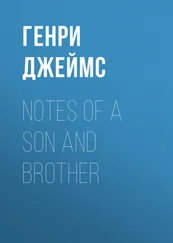Генри Джеймс - A Small Boy and Others
Здесь есть возможность читать онлайн «Генри Джеймс - A Small Boy and Others» — ознакомительный отрывок электронной книги совершенно бесплатно, а после прочтения отрывка купить полную версию. В некоторых случаях можно слушать аудио, скачать через торрент в формате fb2 и присутствует краткое содержание. Жанр: foreign_prose, foreign_antique, на английском языке. Описание произведения, (предисловие) а так же отзывы посетителей доступны на портале библиотеки ЛибКат.
- Название:A Small Boy and Others
- Автор:
- Жанр:
- Год:неизвестен
- ISBN:нет данных
- Рейтинг книги:5 / 5. Голосов: 1
-
Избранное:Добавить в избранное
- Отзывы:
-
Ваша оценка:
- 100
- 1
- 2
- 3
- 4
- 5
A Small Boy and Others: краткое содержание, описание и аннотация
Предлагаем к чтению аннотацию, описание, краткое содержание или предисловие (зависит от того, что написал сам автор книги «A Small Boy and Others»). Если вы не нашли необходимую информацию о книге — напишите в комментариях, мы постараемся отыскать её.
A Small Boy and Others — читать онлайн ознакомительный отрывок
Ниже представлен текст книги, разбитый по страницам. Система сохранения места последней прочитанной страницы, позволяет с удобством читать онлайн бесплатно книгу «A Small Boy and Others», без необходимости каждый раз заново искать на чём Вы остановились. Поставьте закладку, и сможете в любой момент перейти на страницу, на которой закончили чтение.
Интервал:
Закладка:
The grim little generalisation remained, none the less, and I may speak of it—since I speak of everything—as still standing: the striking evidence that scarce aught but disaster could , in that so unformed and unseasoned society, overtake young men who were in the least exposed. Not to have been immediately launched in business of a rigorous sort was to be exposed—in the absence I mean of some fairly abnormal predisposition to virtue; since it was a world so simply constituted that whatever wasn't business, or exactly an office or a "store," places in which people sat close and made money, was just simply pleasure, sought, and sought only, in places in which people got tipsy. There was clearly no mean, least of all the golden one, for it was just the ready, even when the moderate, possession of gold that determined, that hurried on, disaster. There were whole sets and groups, there were "sympathetic," though too susceptible, races, that seemed scarce to recognise or to find possible any practical application of moneyed, that is of transmitted, ease, however limited, but to go more or less rapidly to the bad with it—which meant even then going as often as possible to Paris. The bright and empty air was as void of "careers" for a choice as of cathedral towers for a sketcher, and I passed my younger time, till within a year or two of the Civil War, with an absolute vagueness of impression as to how the political life of the country was carried on. The field was strictly covered, to my young eyes, I make out, by three classes, the busy, the tipsy, and Daniel Webster. This last great man must have represented for us a class in himself; as if to be "political" was just to be Daniel Webster in his proper person and with room left over for nobody else. That he should have filled the sky of public life from pole to pole, even to a childish consciousness not formed in New England and for which that strenuous section was but a name in the geography-book, is probably indeed a sign of how large, in the general air, he comparatively loomed. The public scene was otherwise a blank to our young vision, I discern, till, later on, in Paris, I saw—for at that unimproved period we of the unfledged didn't suppose ourselves to "meet"—Charles Sumner; with whose name indeed there further connects itself the image of a thrilled hour in the same city some months before: the gathering of a group of indignant persons on the terrace of a small old-world hôtel or pavilion looking out on the Avenue des Champs Elysées, slightly above the Rond-Point and just opposite the antediluvian Jardin d'Hiver (who remembers the Jardin d'Hiver, who remembers the ancient lodges of the octroi , the pair of them facing each other at the Barrière de l'Étoile?) and among them a passionate lady in tears over the news, fresh that morning, of the assault on Sumner by the South Carolina ruffian of the House. The wounded Senator, injured in health, had come to Europe later on to recuperate, and he offered me my first view, to the best of my belief, not only of a "statesman," but of any person whomsoever concerned in political life. I distinguish in the earlier twilight of Fourteenth Street my father's return to us one November day—we knew he had been out to vote—with the news that General Winfield Scott, his and the then "Whig" candidate, had been defeated for the Presidency; just as I rescue from the same limbo my afterwards proud little impression of having "met" that high-piled hero of the Mexican War, whom the Civil War was so soon and with so little ceremony to extinguish, literally met him, at my father's side, in Fifth Avenue, where he had just emerged from a cross-street. I remain vague as to what had then happened and scarce suppose I was, at the age probably of eight or nine, "presented"; but we must have been for some moments face to face while from under the vast amplitude of a dark blue military cloak with a big velvet collar and loosened silver clasp, which spread about him like a symbol of the tented field, he greeted my parent—so clear is my sense of the time it took me to gape all the way up to where he towered aloft.
V
The not very glorious smoke of the Mexican War, I note for another touch, had been in the air when I was a still smaller boy, and I have an association with it that hovers between the definite and the dim, a vision of our uncle (Captain as he then was) Robert Temple, U.S.A., in regimentals, either on his way to the scene of action or on the return from it. I see him as a person half asleep sees some large object across the room and against the window-light—even if to the effect of my now asking myself why, so far from the scene of action, he was in panoply of war. I seem to see him cock-hatted and feathered too—an odd vision of dancing superior plumes which doesn't fit if he was only a captain. However, I cultivate the wavering shade merely for its value as my earliest glimpse of any circumstance of the public order—unless indeed another, the reminiscence to which I owe to-day my sharpest sense of personal antiquity, had already given me the historic thrill. The scene of this latter stir of consciousness is, for memory, an apartment in one of the three Fifth Avenue houses that were not long afterward swallowed up in the present Brevoort Hotel, and consists of the admired appearance of my uncles "Gus" and John James to announce to my father that the Revolution had triumphed in Paris and Louis Philippe had fled to England. These last words, the flight of the king, linger on my ear at this hour even as they fell there; we had somehow waked early to a perception of Paris, and a vibration of my very most infantine sensibility under its sky had by the same stroke got itself preserved for subsequent wondering reference. I had been there for a short time in the second year of my life, and I was to communicate to my parents later on that as a baby in long clothes, seated opposite to them in a carriage and on the lap of another person, I had been impressed with the view, framed by the clear window of the vehicle as we passed, of a great stately square surrounded with high-roofed houses and having in its centre a tall and glorious column. I had naturally caused them to marvel, but I had also, under cross-questioning, forced them to compare notes, as it were, and reconstitute the miracle. They knew what my observation of monumental squares had been—and alas hadn't; neither New York nor Albany could have offered me the splendid perspective, and, for that matter, neither could London, which moreover I had known at a younger age still. Conveyed along the Rue St.-Honoré while I waggled my small feet, as I definitely remember doing, under my flowing robe, I had crossed the Rue de Castiglione and taken in, for all my time, the admirable aspect of the Place and the Colonne Vendôme. I don't now pretend to measure the extent to which my interest in the events of 1848—I was five years old—was quickened by that souvenir , a tradition further reinforced, I should add, by the fact that some relative or other, some member of our circle, was always either "there" ("there" being of course generally Europe, but particularly and pointedly Paris) or going there or coming back from there: I at any rate revert to the sound of the rich words on my uncles' lips as to my positive initiation into History. It was as if I had been ready for them and could catch on; I had heard of kings presumably, and also of fleeing: but that kings had sometimes to flee was a new and striking image, to which the apparent consternation of my elders added dramatic force. So much, in any case, for what I may claim—perhaps too idly—on behalf of my backward reach.
It has carried me far from my rather evident proposition that if we saw the "natural" so happily embodied about us—and in female maturity, or comparative maturity, scarce less than in female adolescence—this was because the artificial, or in other words the complicated, was so little there to threaten it. The complicated, as we were later on to define it, was but another name for those more massed and violent assaults upon the social sense that we were to recognise subsequently by their effects—observing thus that a sense more subtly social had so been created, and that it quite differed from that often almost complete inward blankness, in respect to any circumjacent, any constituted, order to the exhibition of which our earlier air and our family scene had inimitably treated us. We came more or less to see that our young contemporaries of another world, the trained and admonished, the disciplined and governessed, or in a word the formed, relatively speaking, had been made aware of many things of which those at home hadn't been; yet we were also to note—so far as we may be conceived as so precociously "noting," though we were certainly incorrigible observers—that, the awareness in question remaining at the best imperfect, our little friends as distinguished from our companions of the cousinship, greater and less, advanced and presumed but to flounder and recede, elated at once and abashed and on the whole but feebly sophisticated. The cousinship, on the other hand, all unalarmed and unsuspecting and unembarrassed, lived by pure serenity, sociability and loquacity; the oddest fact about its members being withal that it didn't make them bores, I seem to feel as I look back, or at least not worse bores than sundry specimens of the other growth. There can surely never have been anything like their good faith and, generally speaking, their amiability. I should have but to let myself go a little to wish to cite examples—save that in doing so I should lose sight of my point; which is to recall again that whether we were all amiable or not (and, frankly, I claim it in a high degree for most of us) the scene on which we so freely bloomed does strike me, when I reckon up, as extraordinarily unfurnished. How came it then that for the most part so simple we yet weren't more inane? This was doubtless by reason of the quantity of our inward life—ours of our father's house in especial I mean—which made an excellent, in some cases almost an incomparable, fond for a thicker civility to mix with when growing experience should begin to take that in. It was also quaint, among us, I may be reminded, to have begun with the inward life; but we began, after the manner of all men, as we could, and I hold that if it comes to that we might have begun much worse.
Читать дальшеИнтервал:
Закладка:
Похожие книги на «A Small Boy and Others»
Представляем Вашему вниманию похожие книги на «A Small Boy and Others» списком для выбора. Мы отобрали схожую по названию и смыслу литературу в надежде предоставить читателям больше вариантов отыскать новые, интересные, ещё непрочитанные произведения.
Обсуждение, отзывы о книге «A Small Boy and Others» и просто собственные мнения читателей. Оставьте ваши комментарии, напишите, что Вы думаете о произведении, его смысле или главных героях. Укажите что конкретно понравилось, а что нет, и почему Вы так считаете.











